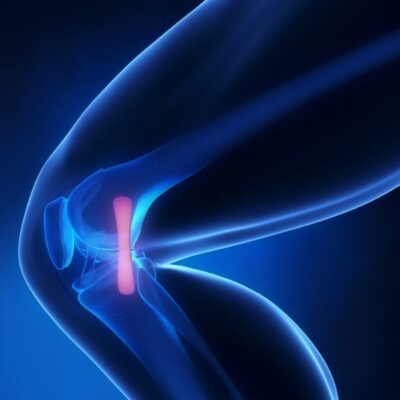MCL Tear Specialist

Are you an athlete who participates in contact sports, or jumping and landing? If so, you may be at risk of tearing your MCL. An MCL injury can be sustained during an awkward landing in athletic activities, dirt biking injury or from a tackle in football. MCL tear specialist, Dr. James Mazzara provides diagnosis and both surgical and nonsurgical treatment options for patients in Manchester, South Windsor, Enfield, Glastonbury and surrounding Hartford communities who have developed an MCL tear. Contact Dr. Mazzara’s team today!
MCL Tear, Injury to the Medial Cruciate Ligament of the Knee
What is an MCL Injury or Tear?
The medial collateral ligament (MCL) is located on the outside of the knee joint, on the inner aspect of the knee, connecting the femur (thigh bone) to the tibia (shin bone.) The MCL’s job is to give the knee side-to-side stability and to keep it from collapsing inward. An MCL injury to knee occurs when extreme force is applied to the lateral (outer) side of the knee, causing the ligament on the inside to stretch or tear. MCL injuries are often seen in football players, or other athletes that participate in contact sports. Residence in Manchester, South Windsor, Enfield, Glastonbury and surrounding Hartford communities that have experienced an MCL injury are encouraged to contact Dr. James Mazzara, orthopedic knee specialist. Dr. Mazzara is highly trained and skilled at treating knee injuries, such as an MCL injury or tear.
How Does an MCL Injury or Tear Occur?
A medial collateral ligament strain, sprain, injury or tear can be seen most often in athletes and active patients. Activities that can cause an MCL Injury include direct contact sports, such as football. If the knee sustains a direct blow to the outside of the knee, it can cause the inside ligament to stretch beyond its normal range, causing an injury.
MCL Tears are classified in the following grades:
- Grade 1: The least severe, when the ligament is stretched but not torn.
- Grade 2: The MCL has been partially torn and is causing instability in the knee.
- Grade 3: The most severe type of tear, where the MCL is torn completely and the joint is very unstable.
What are the Symptoms of an Injured Medial Collateral Ligament?
Symptoms of an injured MCL are similar to other knee injuries and should be evaluated by Dr. Mazzara. Patients who experience an MCL injury often have these symptoms:
- A popping sound when the injury occurs
- Pain and tenderness on the inner side of the knee.
- Swelling of the knee joint
- Locking or catching in the knee
- Limited range of motion
- Knee instability – the feeling of it “giving way”
How is an MCL Injury Diagnosed?
Dr. Mazzara will conduct a thorough examination of the knee and conduct a series of tests to determine the stability of the knee, strength and pain symptoms. Dr. Mazzara will often use an x-ray to check for bone involvement as well as an MRI to evaluate the ligaments, tendons and cartilage.
How is a Torn MCL Treated?
The grade of MCL injury will determine, in part, if the knee can be treated surgically or non-surgically. Grades 1 and 2 sprains or partial tears can often be treated without surgery. A grade 3 tear requires surgical intervention to return the knee to its prior-injury function.
What are Non-surgical Treatment Options for an MCL injury?
A stretched or partially torn MCL with minor knee instability may be effectively treated with a combination of rest, ice, heat, physical therapy and bracing of the joint. Conservative treatment usually corrects the ligament injury with the ability to return to regular activities in 6-8 weeks
How is an MCL Tear Treated with Surgery?
A complete tear of the MCL often involves other ligaments and soft tissue damage in the knee. If necessary, Dr. Mazzara will use a minimally invasive surgery technique to assess and repair the damage in the knee. This type of surgery involves a small camera and special small instruments that help conduct surgery within the knee. In cases of severe damage, or when multiple ligaments have been torn, Dr. Mazzara may use an open method of surgery where a slightly larger incision is made so he can see the joint and make multiple repairs.
MCL surgery to reconstruct or repair the ligament is done with an open procedure where Dr. Mazzara sutures the torn ligament back together, or down to the bone. If the ligament has incurred severe damage and cannot be repaired, he may use a graft, either from the patient or from a donor to facilitate healing. In addition, a synthetic ligament augmentation device made of an extremely strong ribbon like material may be used when an MCL repair is performed with a simultaneous collateral ligament (ACL) reconstruction. This internal brace supports the MCL while it heals and protects the reconstructed ACL graft from excessive and abnormal stresses which may lead to its failure.
What will the Outcome of MCL Injury Treatment Be?
The outcome of an MCL injury, if handled properly is generally good, regardless of the need for surgical, or non-surgical treatment. A minor MCL injury can feel much better in as little as a week. Grade 2 injuries can take about 4 weeks to feel better and grade 3 tears as long as 8 weeks. Although it may take the MCL to take only 6 weeks to heal, there may be some tenderness and pain that lasts several months. As long as the knee is stable and does not collapse or give way with minimal stress, this pain will eventually resolve in most patients. If proper rehabilitation has been completed, most patients are able to return to their sports and daily activities without restriction.
If you have questions about the treatment for an MCL injury or if you have a knee injury, please contact the orthopedic offices of Dr. James Mazzara, knee specialist in Manchester, South Windsor, Enfield, Glastonbury and surrounding Hartford communities.
